Related Research Articles
Ronald Grant Taylor was an English-Australian actor best known as the abrasive General Henderson in the Gerry Anderson science fiction series UFO and for his lead role in Forty Thousand Horsemen (1940).

Cinesound Productions Pty Ltd was an Australian feature film production company. Established in June 1931, Cinesound developed out of a group of companies centred on Greater Union Theatres that covered all facets of the film process, from production to distribution and exhibition. Cinesound Productions established a film studio as a subsidiary of Greater Union Theatres Pty Ltd based on the Hollywood model. The first production was On Our Selection (1932), which was an enormous financial success.

John F. Gavin was a pioneer Australian film actor and director, one of the early filmmakers of the 1910s. He is best known for making films about bushrangers such as Captain Thunderbolt, Captain Moonlite, Ben Hall and Frank Gardiner. Known informally as 'Jack', Gavin worked in collaboration with his wife Agnes, who scripted many of his films.
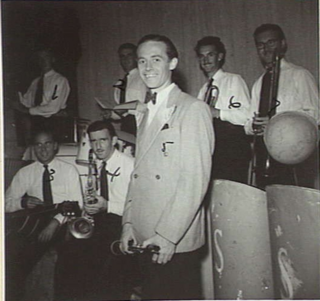
Horace Andrew Dargie was an Australian musician, television compère, talent manager, music label founder and music arranger. As a member of Horrie Dargie Quintet he was awarded the first gold record in Australia for their 10-inch live album, Horrie Dargie Concert (1952), which sold 75,000 copies. In the late 1950s and early 1960s he compèred TV variety programmes Personally Yours (1959), BP Super Show (1959–1962) and The Delo and Daly Show (1963–1964). Dargie co-produced teen pop music programme, The Go!! Show (1964–1967), and as well as organising its on-screen performers he established the related Go!! Records label to provide an outlet for artists' singles. He was inducted into the ARIA Hall of Fame in 1996. Dargie was married twice.
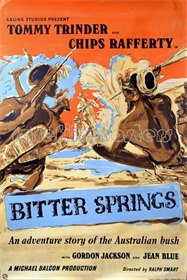
Bitter Springs is a 1950 Australian–British film directed by Ralph Smart. An Australian pioneer family leases a piece of land from the government in the Australian outback in 1900 and hires two inexperienced British men as drovers. Problems with local Aboriginal people arise over the possession of a waterhole. Much of the film was shot on location in the Flinders Ranges in South Australia
Dad and Dave Come to Town is a 1938 Australian comedy film directed by Ken G. Hall, the third in the 'Dad and Dave' comedy series starring Bert Bailey. It was the feature film debut of Peter Finch and is one of the best known Australian films of the 1930s.

Forty Thousand Horsemen is a 1940 Australian war film directed by Charles Chauvel. The film tells the story of the Australian Light Horse which operated in the desert at the Sinai and Palestine campaign during World War I. It follows the adventures of three rowdy heroes in fighting and romance. The film culminates at the Battle of Beersheba which is reputedly "the last successful cavalry charge in history". The film was clearly a propaganda weapon, to aid in recruitment and lift the pride of Australians at home during World War II. It was one of the most successful Australian movies of its day. It was later remade in 1987 as The Lighthorsemen.
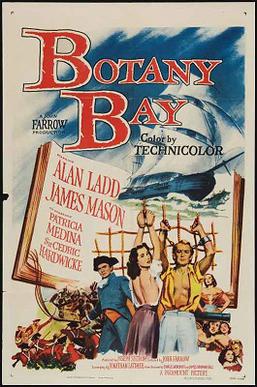
Botany Bay is a 1953 American adventure film directed by John Farrow and starring Alan Ladd, James Mason and Patricia Medina. It was based on a novel of the same name by Charles Nordhoff and James Norman Hall.
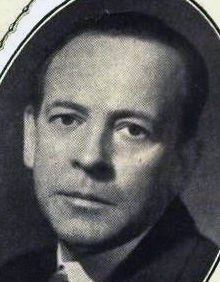
Frank Harvey was a British-born actor, producer, and writer, best known for his work in Australia.

Lovers and Luggers is a 1937 Australian film directed by Ken G. Hall. It is an adventure melodrama about a pianist who goes to Thursday Island to retrieve a valuable pearl.

Francis William Thring III, better known as F. W. Thring, was an Australian film director, producer, and exhibitor. He has been credited with the invention of the clapperboard.
Alexander Roy Harwood (1897–1980), better known as A. R. Harwood, or Dick Harwood, was an Australian film director and producer who also worked in exhibition. He was inspired to become a filmmaker when he was posted to Tahiti to work for an insurance company and watched the shooting of Never the Twain Shall Meet (1925). He returned to Australia and produced and directed The Man Who Forgot (1927).
Night Club is a 1952 Australian film musical directed by A. R. Harwood. It is a remake of Harwood's 1938 film, Show Business.

The Avenger is a 1937 Australian film directed by A. R. Harwood.
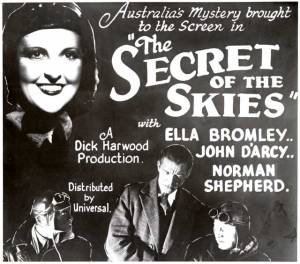
The Secret of the Skies is a 1934 Australian film directed by A. R. Harwood about a bank robber who crashes an aircraft in remote bush. The story was inspired by the 1931 disappearance of the Australian National Airways aircraft the Southern Cloud.
Spur of the Moment is a 1931 Australian film directed by A. R. Harwood. It was one of the first Australian talking movies.
Waltzing Matilda is a 1933 Australian film directed by and starring Pat Hanna. It features Coral Browne.
Clara Gibbings is a 1934 Australian film directed by F.W. Thring about the owner of a London pub who discovers she is the daughter of an earl. It was a vehicle for stage star Dorothy Brunton.
The MacMahon brothers were entrepreneurs in Australian show business. Chief among them were James MacMahon and Charles MacMahon, who together and separately toured a large number of stage shows. Their younger brothers, Joseph and William, were involved in many of those activities.
Pearl Lust is a 1936 Australian film directed by A. R. Harwood. It was shot in 16mm and was never released theatrically as it was aimed at the home movie market.
References
- ↑ Andrew Pike and Ross Cooper, Australian Film 1900–1977: A Guide to Feature Film Production, Melbourne: Oxford University Press, 1998, 182.
- ↑ "No Easy Money In Films". Smith's Weekly . Vol. XXIX, no. 22. New South Wales, Australia. 26 July 1947. p. 26. Retrieved 13 March 2024– via National Library of Australia.
- ↑ "THEATRE ROYAL". Camperdown Chronicle . Vic. 19 December 1939. p. 2. Retrieved 4 April 2012– via National Library of Australia.
- ↑ "Australia's 'Lost' Films'". National Film and Sound Archive.
- ↑ "Miss B. James' Charming Personality". The Barrier Miner (HOME ed.). Broken Hill, NSW. 4 October 1938. p. 4. Retrieved 15 August 2012– via National Library of Australia.
- ↑ "STAGE AND FILM JOBS". The Sydney Morning Herald . 2 June 1938. p. 26. Retrieved 15 August 2012– via National Library of Australia.
- ↑ "A FILM CRITIC'S DIARY". The Argus . Melbourne. 20 April 1938. p. 4. Retrieved 6 April 2012– via National Library of Australia.
- ↑ "BRIEF ITEMS IN THE NEWS". The Argus . Melbourne. 4 May 1938. p. 20. Retrieved 15 August 2012– via National Library of Australia.
- ↑ "COMPANY ARRIVES TO MAKE FILM". The Sydney Morning Herald . 17 May 1938. p. 9. Retrieved 6 April 2012– via National Library of Australia.
- ↑ "PRODUCTION OF NEW FILM". The Argus . Melbourne. 17 May 1938. p. 16. Retrieved 15 August 2012– via National Library of Australia.
- ↑ "FILM CRITIC'S DIARY". The Argus . Melbourne. 13 July 1938. p. 16. Retrieved 15 August 2012– via National Library of Australia.
- ↑ "FILM STUDIOS NOT CLOSING". The Argus . Melbourne. 23 March 1938. p. 2. Retrieved 6 April 2012– via National Library of Australia.
- ↑ "NEWS IN BRIEF". The Argus . Melbourne. 13 September 1938. p. 2. Retrieved 15 August 2012– via National Library of Australia.
- ↑ Vagg, Stephen (23 December 2019). "Australian Film Musicals You Probably Didn't Realise Existed". Filmink.